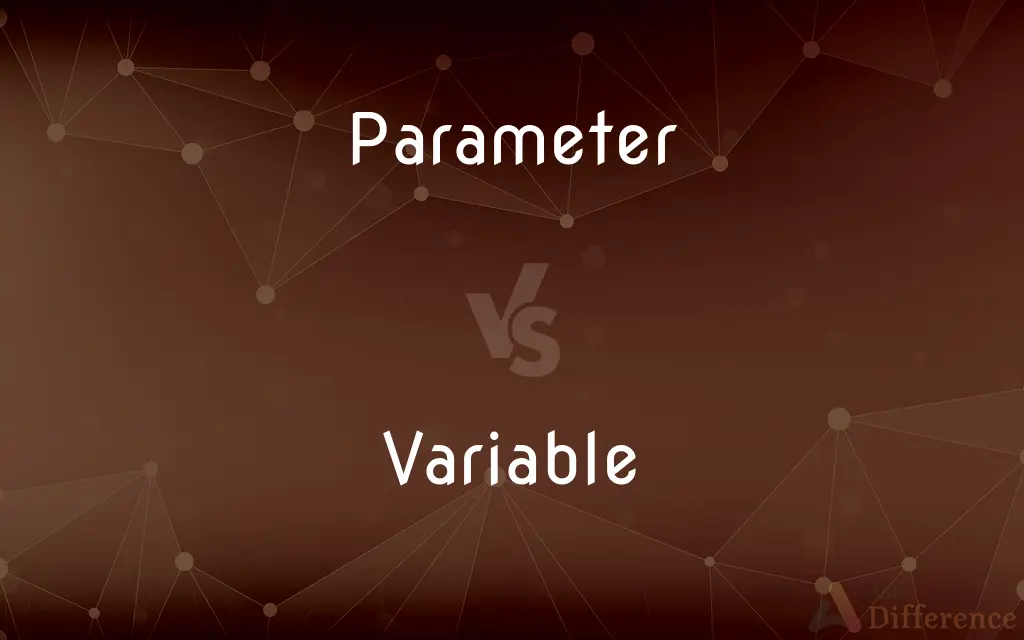Parameter vs. Variable — What's the Difference?
By Tayyaba Rehman & Urooj Arif — Updated on March 20, 2024
A parameter is a variable in the definition of a function, acting as a placeholder for input values, whereas a variable is a storage location with a name and value that can change.

Difference Between Parameter and Variable
Table of Contents
ADVERTISEMENT
Key Differences
Parameters are specific to functions in programming and mathematical contexts, serving as placeholders for values that are passed into functions. They define what kind of data a function can accept, setting the framework for the function's operation. Variables, on the other hand, are more general and can be used anywhere in the code to store data that can change over time. They are the fundamental building blocks that hold information which can be manipulated.
In the context of a function, parameters appear in the function's definition and are used when the function is called to accept actual values (arguments). This allows functions to operate on different data without modification. Whereas variables can be used both inside and outside functions, holding values that can be reassigned or manipulated as the program runs, making them versatile in managing data.
Parameters are often seen in the context of the scope of a function, where they exist only within that function and serve a specific role in its operation. They are initialized when the function is called and cease to exist once the function completes its execution. Variables, however, can have different scopes—local or global—depending on where they are declared, affecting where they can be accessed and modified.
While parameters are essential for the customization and flexibility of functions, allowing the same function to perform operations on different sets of data, variables are used to store and manipulate data throughout the program. This distinction makes parameters key in defining functions' behaviors, whereas variables are central to storing and changing data within a program.
Parameters and variables also differ in their usage beyond functions. While parameters are specific to the context of functions and procedures, variables are used across various programming constructs, including loops, conditionals, and more, making them more broadly applicable in programming and algorithm design.
ADVERTISEMENT
Comparison Chart
Definition
A named entity in a function definition, serving as a placeholder for an argument
A named storage location that can hold a value which may change
Scope
Limited to the function or method in which it is defined
Can be global or local, depending on the declaration
Lifetime
Exists only within the context of a function call
Persists according to its scope, may exist throughout the program execution
Usage
Used to define what a function expects as input
Used to store and manipulate data within a program
Reusability
Parameters are reinitialized with each function call
Variables can be reused and reassigned with different values
Compare with Definitions
Parameter
A variable in a function definition used to accept input.
In def add(x, y), x and y are parameters.
Variable
A named location that stores data values.
Count = 10, where count is a variable.
Parameter
Acts as a placeholder for data passed to functions.
Parameters width and height in a calculate_area function.
Variable
Integral to both simple and complex programming tasks.
Total = price * quantity, where total, price, and quantity are variables.
Parameter
Determines the function's input interface.
A and b in def sum(a, b) define the inputs the function can accept.
Variable
Can be reassigned and manipulated.
Score += 10, where score is a variable that is being updated.
Parameter
Defined within the parentheses of a function definition.
Def greet(name), where name is the parameter.
Variable
Can have different data types.
Age = 30 (integer), name = Bob (string).
Parameter
Specific to the function's scope.
Radius in circle_area(radius) exists only within the function.
Variable
Used throughout programming for data storage.
Name = Alice stores a string in the variable name.
Parameter
A parameter (from the Ancient Greek παρά, para: "beside", "subsidiary"; and μέτρον, metron: "measure"), generally, is any characteristic that can help in defining or classifying a particular system (meaning an event, project, object, situation, etc.). That is, a parameter is an element of a system that is useful, or critical, when identifying the system, or when evaluating its performance, status, condition, etc.
Variable
Likely to change or vary; subject to variation; changeable.
Parameter
A numerical or other measurable factor forming one of a set that defines a system or sets the conditions of its operation
There are three parameters by which a speaker is able to modify the meaning of the utterance—pitch, volume, and tempo
Variable
Inconstant; fickle.
Parameter
A limit or boundary which defines the scope of a particular process or activity
The parameters within which the media work
Variable
(Biology) Tending to exhibit genetic variation or variation in a physical trait
Geographically variable color patterns.
Parameter
A constant in an equation that varies in other equations of the same general form, especially such a constant in the equation of a curve or surface that can be varied to represent a family of curves or surfaces.
Variable
(Mathematics) Having no fixed quantitative value.
Parameter
One of a set of independent variables that express the coordinates of a point.
Variable
Something that varies or is prone to variation.
Parameter
One of a set of measurable factors, such as temperature and pressure, that define a system and determine its behavior and are varied in an experiment.
Variable
(Astronomy) A variable star.
Parameter
Usage Problem A factor that restricts what is possible or what results
"all the parameters of shelter—where people will live, what mode of housing they will choose, and how they will pay for it" (New York).
Variable
A quantity capable of assuming any of a set of values.
Parameter
A factor that determines a range of variations; a boundary
An experimental school that keeps expanding the parameters of its curriculum.
Variable
A symbol representing such a quantity. For example, in the expression a2 + b2 = c2, a,b, and c are variables.
Parameter
(Statistics) A quantity, such as a mean, that is calculated from data and describes a population.
Variable
Able to vary or be varied.
Variable winds or seasons; a variable quantity; a variable resistor
Parameter
Usage Problem A distinguishing characteristic or feature.
Variable
Likely to vary.
Parameter
A value kept constant during an experiment, equation, calculation, or similar, but varied over other versions of the experiment, equation, calculation, etc.
Variable
Marked by diversity or difference.
Parameter
(sciences) A variable that describes some system (material, object, event, etc.) or some aspect thereof.
Variable
(mathematics) Having no fixed quantitative value.
Parameter
(statistics) Any measured quantity of a statistical population that summarises or describes an aspect of the population.
Variable
(biology) Tending to deviate from a normal or recognized type.
Parameter
(machine learning) A variable of a model that is trained by a machine learning algorithm.
Variable
Something that is variable.
Parameter
(programming) An input variable of a function definition, that gets an actual value (argument) at execution time.
Variable
Something whose value may be dictated or discovered.
There are several variables to consider here.
Parameter
An actual value given to such a formal parameter.
Variable
(mathematics) A symbol representing a variable.
Parameter
A characteristic or feature that distinguishes something from others.
Variable
(programming) A named memory location in which a program can store intermediate results and from which it can read them.
Parameter
(geometry) In the ellipse and hyperbola, a third proportional to any diameter and its conjugate, or in the parabola, to any abscissa and the corresponding ordinate.
The parameter of the principal axis of a conic section is called the latus rectum.
Variable
(astronomy) A variable star.
Parameter
(crystallography) The ratio of the three crystallographic axes which determines the position of any plane.
Variable
(nautical) A shifting wind, or one that varies in force.
Parameter
(crystallography) The fundamental axial ratio for a given species.
Variable
Those parts of the sea where a steady wind is not expected, especially the parts between the trade-wind belts.
Parameter
A constant number which is part of a theory, function, or calculation, whose value is not determined by the form of the theory or equation itself, and may in some cases be arbitrary assigned.
Variable
Having the capacity of varying or changing; capable of alternation in any manner; changeable; as, variable winds or seasons; a variable quantity.
Parameter
A term applied to some characteristic magnitude whose value, invariable as long as one and the same function, curve, surface, etc., is considered, serves to distinguish that function, curve, surface, etc., from others of the same kind or family.
Variable
Liable to vary; too susceptible of change; mutable; fickle; unsteady; inconstant; as, the affections of men are variable; passions are variable.
Lest that thy love prove likewise variable.
His heart, I know, how variable and vain!
Parameter
Any constant number which is required to calculate values of observed phenomena according to a theory, but the value of which must be determined by experiment, and cannot be calculated from the fundamental assumptions of the theory. In general, a theory which has a large number of parameters, though it may accurately predict experimental results, is considered as having less explanatory power and as being less esthetically pleasing than a theory with fewer parameters.
Variable
That which is variable; that which varies, or is subject to change.
Parameter
The ratio of the three crystallographic axes which determines the position of any plane; also, the fundamental axial ratio for a given species.
Variable
A quantity which may increase or decrease; a quantity which admits of an infinite number of values in the same expression; a variable quantity; as, in the equation x2 - y2 = R2, x and y are variables.
Parameter
The limits, guidelines, or assumptions from within which an activity is carried out; as, new arrivals need to learn the parameters of the research in our department.
Variable
A shifting wind, or one that varies in force.
Parameter
A variable used in a calculation within a computer program which must be assigned a value before the calculation can be performed; as, let's plug in the parameters and see what the result is.
Variable
Something that is likely to vary; something that is subject to variation;
The weather is one variable to be considered
Parameter
A characteristic or element, especially one used as a criterion for evaluation or judgment; as, a useful parameter for determining efficiency.
Variable
A quantity that can assume any of a set of values
Parameter
A constant in the equation of a curve that can be varied to yield a family of similar curves
Variable
A star that varies noticeably in brightness
Parameter
Any factor that defines a system and determines (or limits) its performance
Variable
A symbol (like x or y) that is used in mathematical or logical expressions to represent a variable quantity
Parameter
A quantity (such as the mean or variance) that characterizes a statistical population and that can be estimated by calculations from sample data
Variable
Liable to or capable of change;
Rainfall in the tropics is notoriously variable
Variable winds
Variable expenses
Variable
Marked by diversity or difference;
The varying angles of roof slope
Nature is infinitely variable
Variable
(used of a device) designed so that a property (as e.g. light) can be varied;
A variable capacitor
Variable filters in front of the mercury xenon lights
Common Curiosities
How do parameters and variables differ in scope?
Parameters have a local scope within the function they belong to, while variables can have local or global scopes depending on where they are declared.
Is it possible for a parameter and a variable to have the same name?
Yes, but within a function, the parameter name will take precedence within the function's scope.
Can a variable be used as a parameter?
Yes, variables can be passed as arguments to functions, where they correspond to the function's parameters.
What is a parameter?
A parameter is a named entity in a function definition, serving as a placeholder for data that the function can accept as input.
Why are variables important in programming?
Variables are essential for storing, retrieving, and manipulating data, making them fundamental to program operation.
How does the reusability of parameters and variables differ?
Parameters are reinitialized with each function call, while variables can be reused and reassigned multiple times.
How do parameters affect a function's behavior?
Parameters allow functions to accept different inputs, making them versatile and reusable for various data.
How do parameters enhance function flexibility?
By allowing functions to operate on different sets of data without needing to change the function's code.
Can a parameter exist outside of a function?
No, parameters are specific to functions and exist only within the context of function definitions and calls.
What is a variable?
A variable is a named storage location in a program that can hold a value, which may change during program execution.
Can a function have multiple parameters?
Yes, functions can have multiple parameters, separated by commas in the function definition.
Do variables need to be initialized when declared?
In some programming languages, variables must be initialized upon declaration, while in others, they can be declared without initialization.
Can parameters have default values?
Yes, in many programming languages, parameters can have default values, used if no argument is passed.
Are parameters mandatory for all functions?
No, some functions may not require any parameters and operate without them.
In what contexts are variables used outside of functions?
Variables are used in loops, conditionals, and global settings, among other programming constructs, to store and manipulate data.
Share Your Discovery

Previous Comparison
Moment vs. Spell
Next Comparison
Beer vs. RumAuthor Spotlight
Written by
Tayyaba RehmanTayyaba Rehman is a distinguished writer, currently serving as a primary contributor to askdifference.com. As a researcher in semantics and etymology, Tayyaba's passion for the complexity of languages and their distinctions has found a perfect home on the platform. Tayyaba delves into the intricacies of language, distinguishing between commonly confused words and phrases, thereby providing clarity for readers worldwide.
Co-written by
Urooj ArifUrooj is a skilled content writer at Ask Difference, known for her exceptional ability to simplify complex topics into engaging and informative content. With a passion for research and a flair for clear, concise writing, she consistently delivers articles that resonate with our diverse audience.














































